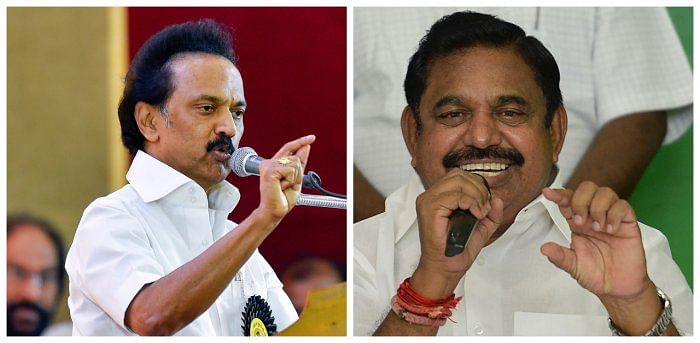
Its election time and prohibition is back in focus in Tamil Nadu where the dry law was lifted about five decades ago. Political parties, including the ruling AIADMK, Opposition DMK and Congress, have pitched for a complete ban on liquor, albeit in a phased manner, making the promise in their respective manifestos for the April 6 assembly elections.
Total prohibition was in force in the state from 1937 to 1971 when the then DMK government headed by M Karunanidhi lifted it first.
The AIADMK and DMK have both bet on phased re-introduction of prohibition and closure of liquor outlets in a staggered manner in their manifestos. PMK, an ally of AIADMK, and MDMK, a partner in the DMK- led front, have also made an assurance to ensure liquor-free Tamil Nadu. While the DMK has also promised de-addiction centres, its ally Congress has presented a detailed roadmap for implementation of prohibition in its separate manifesto.
Also read — Experts flag financial implications over AIADMK, DMK's shower of freebies; doable say parties
Gandhiya Makkal Iyakkam chief Tamizharuvi Manian, who has been in the forefront of anti-liquor campaign for years, is not impressed much by the promises. "The mention of bringing prohibition in the manifestos of AIADMK and DMK is just a passing reference which indicates there is no commitment to implement it," he told PTI. Manian, a Gandhian and former Congress leader who has held several campaigns against liquor, said he would continue to fight for the dry law in the state.
In their manifestos for the 2016 Assembly elections too the two Dravidian parties besides the Congress had assured to enforce a ban on liquor, sale of which is a major revenue earner for the government contributing around Rs 30,000 crore annually. Introducing complete prohibition, which encompasses closure of liquor outlets and a halt to production and storage of spirits, was a hotly debated topic during the 2016 Assembly polls unlike the present election.
In 2015, the demand for prohibition peaked with the death of Gandhian Sasi Perumal during a protest against liquor outlets. Perumal championed the cause of a complete ban on production, storage and consumption of alcoholic products. As part of implementing the AIADMK's promise, then chief minister J Jayalalithaa had issued an order closing down around 500 Indian Made Foreign Liquor shops after assuming power in 2016.
The state Congress recalled that till 1967, when it held the reins of power in Tamil Nadu, total prohibition was in force and there need not be any hesitation in implementing it again. In its poll document, the Tamil Nadu Congress Committee said as soon as a 'new' government assumed office, a high-level committee comprising experts and officials would be formed to work towards imposing a complete ban on liquor. While mulling a ban on alcoholic beverages, the panel would work on ensuring that the proposed move does not lead to the brewing of illicit liquor and also look into ways to offset the loss of revenue -from liquor sale- to the government due to the move, it said. The phased reduction in the number of liquor vends till imposition of a total ban, rehabilitation units in every taluk for people addicted to consuming alcoholic products, including the evils of alcohol in school and college syllabi, stern punishment for brewers of spurious liquor were among the steps promised by the Congress.
The MDMK, in its manifesto, said liquor outlets must be permanently shut and prohibition clamped. The Vaiko-led party too advocated setting up a committee of experts to explore ways to compensate the loss of revenue. The MDMK would continue to work for a liquor-free Tamil Nadu, it said, recalling Vaiko's padyatra years ago to press for prohibition. "Complete prohibition is our goal," the party's manifesto says.
In the past, the DMK had argued that a total liquor ban may lead to a spurt in illicit alcohol that would affect the people. There were also difficulties in enforcing such a ban in view of factors like availability of liquor in all the neighbouring states, the DMK had argued years ago, but it reversed its stand later and promised dry law.
Freedom fighter and Congress stalwart C Rajagopalachari was instrumental in bringing the Tamil Nadu Prohibition Act of 1937, which ensured a dry spell in the state for decades. In 1971, when the then Chief Minister M Karunanidhi lifted prohibition, Rajaji, who was by then steering the Swatantra party, personally visited the DMK patriarch and requested him not to revoke the ban. Though the DMK regime did not heed to his counsel, the party re-introduced the ban three years later.
The AIADMK government (during 1977-81) under Chief Minister M G Ramachandran eased complete prohibition and initially allowed liquor only for permit holders and then such rules were relaxed, turning the clock back to 1971. While earlier licences were auctioned for the operation of liquor outlets, the government took over the business from 2003 with the Tamil Nadu State Marketing Corporation Limited (TASMAC) becoming the sole player.